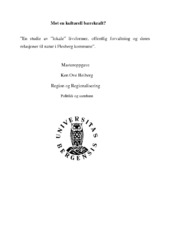| dc.contributor.author | Heiberg, Ken Ove Joakimsen | eng |
| dc.date.accessioned | 2010-02-05T10:51:49Z | |
| dc.date.available | 2010-02-05T10:51:49Z | |
| dc.date.issued | 2009-05-29 | eng |
| dc.date.submitted | 2009-05-29 | eng |
| dc.identifier.uri | https://hdl.handle.net/1956/3781 | |
| dc.description.abstract | This master thesis is about environmental issues in a local context, and how we can achieve sustainable development based on a cultural perspective. The main issue is about why the government believe that local usage of the mountain highland of Blefjell is said be a threat towards sustainable development. By this I want to put fourth an issue for discussion by asking what motivates the local landowners and others in the community to act upon the mountain of Blefjell`s natural resources. It therefore discusses how theories of particular lifemodes can be used as an analytical tool in order to develop local sustainable development in a cultural context. Life-modes are an opportunity to see each individual actor in a broader sense that connects the people in Flesberg Municipality to their natural environment. This is a subject of embodied and cognitive experiences that is connected to Tim Ingolds perspectives on different perceptions of the world, the world as a life-place (from the inside) and the world as a globe (outside), which shows us different understandings of nature. In contrast to this understanding of nature the government has a different perspective of what is appropriate behaviour in the matter of exploitation and preservation of the non- human natural environment. This has implications for how the local community can develop into a better understanding of the environment. Their local perspective that includes both human and non- human environment, and do not make an artificial distinction between culture and nature. In this the local community and the government planning have to meet these challenges by creating a place where local participation can be used as a tool for cultural led sustainable development. There is no absolute solution in this question about sustainability; it is based on healthy relationships between the human and the non- human environment in the local cultural context. In this I conclude that there are possibilities within this perspective, but it is depending on how the state and the local authorities together with the community can use local constituted knowledge in planning. | en_US |
| dc.format.extent | 669281 bytes | eng |
| dc.format.mimetype | application/pdf | eng |
| dc.language.iso | nob | eng |
| dc.publisher | The University of Bergen | eng |
| dc.subject | Natur | nob |
| dc.subject | Bærekraft | nob |
| dc.subject | Lokalsamfunn | nob |
| dc.title | Mot en kulturell bærekraft? ”En studie av ”lokale” livsformer, offentlig forvaltning og deres relasjoner til natur i Flesberg kommune”. | eng |
| dc.type | Master thesis | |
| dc.rights.holder | Copyright the author. All rights reserved | |
| dc.rights.holder | The author | eng |
| dc.description.degree | Master i Region og regionalisering | |
| dc.description.localcode | MAHF-REG | |
| dc.description.localcode | REG350-60 | |
| dc.subject.nus | 713999 | eng |
| dc.subject.nsi | VDP::Humaniora: 000::Kulturvitenskap: 060 | |
| fs.subjectcode | REG350-60 | |
